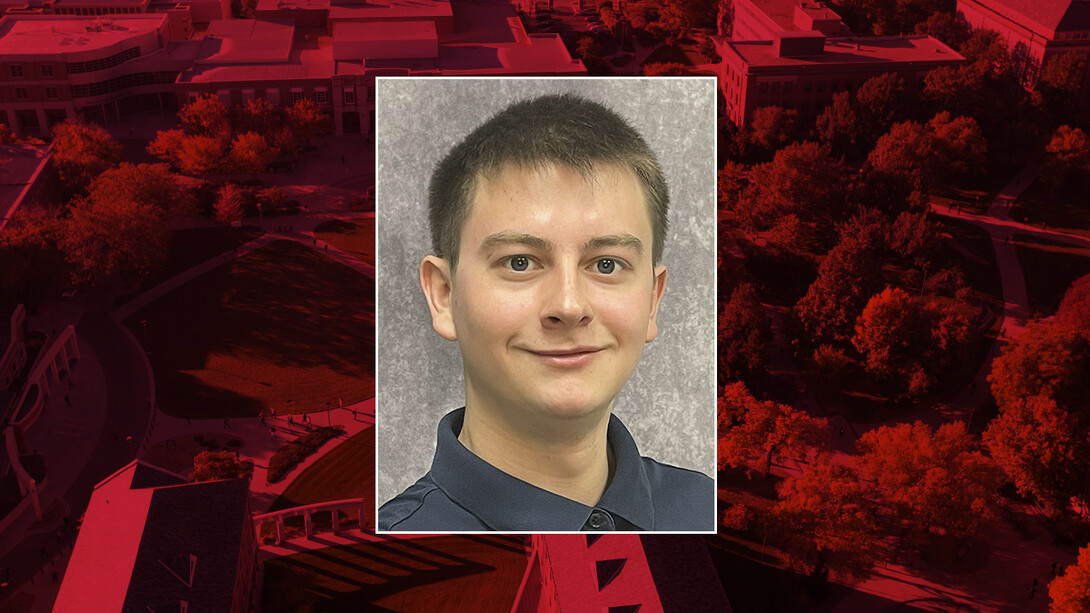
Alex Wagner, a first-year global studies major at the University of Nebraska–Lincoln, has received a Critical Language Scholarship to study Arabic in Nizwa, Oman, this summer.
The Wood River, Nebraska, native said he is eager to gain language proficiency and build mutual understanding between the Midwest and communities in the Middle East.
While attending high school in central Nebraska, Wagner initially thought he would become a pre-law student at the University of Nebraska at Kearney. However, in his senior year, he received a competitive scholarship to study in Jordan through the U.S. Department of State’s Kennedy-Lugar Youth Exchange and Study Abroad (YES Abroad) program.
Wagner’s experience in Jordan was transformative, affording opportunities to learn Arabic and experience cultural activities and daily life with a Jordanian host family and peers. While abroad, he attended a job fair at the U.S. Embassy that changed his career ambitions, sparking interest in the U.S. Foreign Service. After returning from Jordan, he decided to enroll at the University of Nebraska–Lincoln to pursue further studies in Arabic and global studies. He said he enjoys coursework, such as international relations, aligned with his interests in U.S. relationships and foreign affairs.
The YES Abroad program also introduced Wagner to additional U.S. Department of State fellowship opportunities to advance his career, including the Critical Language Scholarship.
“CLS is an amazing award — there’s really nothing like it,” he said. “I want to become fluent in Arabic. After living in Jordan, I realize how indispensable that experience of being there is. I really struggle to speak with people, so my driving reason is that I wanted immersion.”
As a Critical Language Scholar, Wagner plans to travel to the Noor Majan Arabic Institute, where he will experience 18 hours of weekly instruction in Modern Standard Arabic and Omani dialect. The intensive language program covers the equivalent of one year of Arabic instruction in just eight weeks.
“Oman is where I wanted to go the most, because with studying in Jordan, I know the Levant dialect of Arabic,” he said. “And now, coming to Oman, I'll be picking up the Gulf dialect. Having classes in the foundational language and two dialects before the age of 20 is crazy. I’m really going to make the most of being there and spending cumulatively a year of my life in the Middle East. I think that’s going to make my resume look great for the Foreign Service and for any job.”
While in Oman, Wagner hopes to find a program where he can teach English and give back to the community. Upon his return, he hopes to serve the public through local programs like Lincoln Literacy, with goals of strengthening relationships, dispelling unhelpful stereotypes and deepening understanding between Nebraskans and Arabic speakers in the U.S. He sees teaching as an opportunity to share insights about how to get involved in the Lincoln community and experience American cultural traditions.
“I feel a responsibility to communicate that I want people to come here and do the absolute best that they can,” he said.
Family values affirmed Wagner’s interest in gaining the knowledge and skills to help others through community service.
“My dad works with developmentally disabled people, and my mom is a nurse,” he said. “My grandpa especially gives second chances to those who are neglected. He has done a lot for certain homeless people, to get them housing and give them the resources to help themselves. I do my best to make the best for myself so that I can give back but also be self-reliant.”
Wagner also credits faculty mentors in the School of Global Integrative Studies for helping him apply for the Critical Language Scholarship.
“Professor Emira Ibrahimpasic’s help on my essays was invaluable,” he said.
To students considering applying for the scholarship, he offers encouragement.
“Build things to talk about in your essays, go do things, get experiences,” he said. “Reflecting on things that you have done is extremely valuable, because essay readers are looking for how you dealt with the situation, what you learned from it and how you grew. Emphasize what makes you different, something that distinguishes you as an individual, such as an ethnic, cultural or rural background.”
The Critical Language Scholarship is a program of the U.S. Department of State, with funding provided by the U.S. government and supported in its implementation by American Councils for International Education. The program aims to expand the number of Americans studying and mastering foreign languages that are critical to the country’s national security, economic prosperity and engagement with the world. Each summer, participants from colleges and universities across the United States spend about eight weeks studying one of a dozen languages, either overseas or virtually. Participants are selected based on their commitment to language learning and plans to apply their language skills to their academic or professional pursuits. In 2025, more than 500 participants were selected from a pool of more than 5,000 applicants.
At Nebraska, the Office of Undergraduate Research and Fellowships advises and nominates candidates for 30 supported scholarships and fellowships. To learn more, students and campus community members should contact Director Courtney Santos at courtney.santos@unl.edu.







